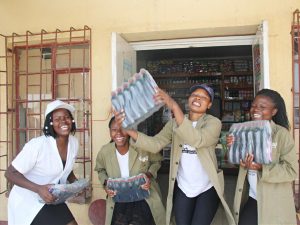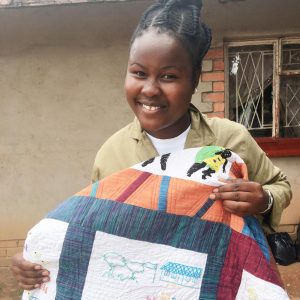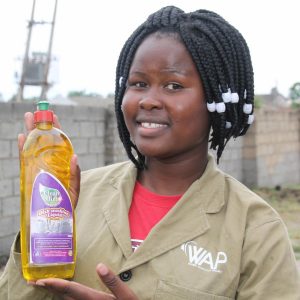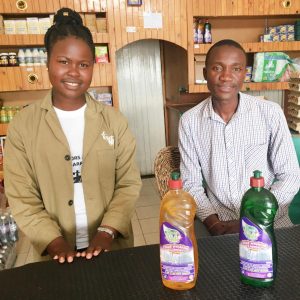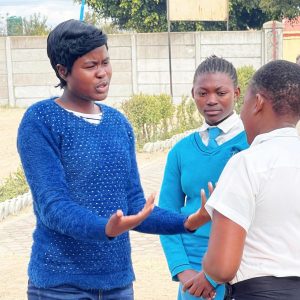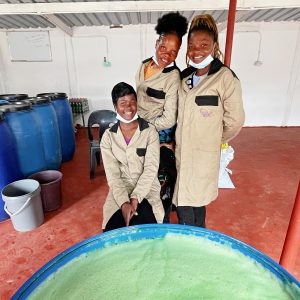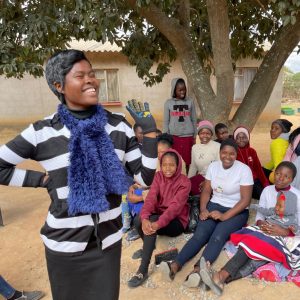ADVOCACYNET 401, January 8, 2024
A Foe of Forced Marriage Ties the Knot in Zimbabwe
An appreciation of Trish Makanhiwa by Iain Guest
When I first met Trish Makanhiwa in 2019 she was reeling from the loss of her mother and terrified that she might be forced to find a rich husband to keep her brother in school and pay the family’s bills.
This past year was a lot different. Trish, 23, supervised the production of more than 70,000 bottles of soap that earned over $45,000 for vulnerable girls in inner-city Harare as well as providing her with a good salary. Capping the year off in style, Trish married her sweetheart, Alvin.
That she has survived and thrived says much about Trish’s strength of character and the resourcefulness of her employer, Women Advocacy Project (WAP), an advocate for women and girls that formed in 2012 to combat child marriage.
Over the past five years WAP has explored many different ways to protect girls from being pressured into marriage. Selling soap tops the list because it reduces the threat from poverty, but WAP has also trained girls to express their fears through embroidery and volunteer in their communities during the darkest days of the pandemic. The organization has also encouraged girls to think internationally by reaching out to students from American high schools.
Every activity has been aimed at giving girls the confidence to choose their own path. Trish has been at the center of it all and Constance Mugari, the founder of WAP, gives her credit for WAP’s most singular achievement. Over 300 girls have worked on the soap program since 2019 and not one married below the legal age while she was with WAP.
Trish’s own marriage, on her own terms, also vindicates Constance’s conviction that the challenge is not marriage itself so much as coercion. “Trish inspires us all,” she told me. A deep friendship now exists between the two women.
*
Early marriage in Zimbabwe has long been a target for advocates and in 2016 Zimbabwe’s constitutional court responded by raising the minimum age to 18. Almost 35% of all girls in Zimbabwe are thought to marry before their 18th birthday compared to 2% of boys. This can be extraordinarily dangerous for young girls during pregnancy and puts an abrupt end to their hopes of education.
The Advocacy Project joined WAP’s campaign in 2018 by recruiting Alex Kotowski, a student at Columbia University and former researcher at Human Rights Watch, to help identify the causes of early marriage. Alex found that one of the worst offenders was a local religious sect known as the White Garment Church, which encourages followers to marry off daughters as young as 12 on the pretext of curbing their sexual activity.
McLane Harrington from the Fletcher School, our 2019 Peace Fellow at WAP, deepened our understanding by examining traditional Shona practices like Kuripa Ngozi which requires families to give a daughter in marriage to pay off a debt or make amends for a crime.
As part of her fellowship, McLane also helped eleven girls who were active in WAP’s program to express their fears through embroidery. One young artist, Beauty Tembo, showed a girl who has been driven from home by her parents after becoming pregnant and is contemplating suicide. Such cases were known to the artists. There is real terror behind their images.
But if traditional practice was part of the problem the main driver behind child and early marriage was also hiding in plain sight, namely poverty.
Tanatswa Sachiti’s story shows a 16 year-old girl who was left to care for six siblings after her parents died and had no choice but to seek an older husband. Tanatswa herself is unmarried. I visited her home in 2019 and was told that her family earned an average of $5 a day. Under this sort of pressure, it is hardly surprising that many families sell their daughters off to wealthier older men.
*
Constance Mugari’s first goal has been to build a culture of peer support for girls. She began by establishing two clubs and selected a tough-minded girl to head each club and serve as an “ambassador” against early marriage. Evelyn Sachiti took the lead in the neighborhood of Chitungwiza, and Trish was elected to head the club in Epworth.
This approach relied heavily on peer support. The clubs would meet every weekend to discuss marriage and if Trish or Evelyn found that a girl felt threatened, Constance would intervene with her parents. I visited the two ambassadors at home in 2019, and found Evelyn to be bubbly and talkative. Trish was reserved and shy. It was very clear that both were deeply respected by other girls in their groups.
Having identified poverty as the primary enemy, Constance and her husband Dickson Mnyaci looked for a practical response. They decided on soap, which is easy to make and guaranteed a market. We raised $4,712 through a GlolbalGiving appeal and asked McLane Harrington, our 2019 Peace Fellow to help launch a start-up. WAP hired a soap trainer, came up with a catchy name (Clean Girl) and started selling in local stores known as “tuck shops.”
By the end of 2019 WAP had sold over 3,000 bottles and when I visited Harare in November, soap-making was in full swing. It was joyous and messy. The girls mixed and bottled their soap in a vacant house before heading out in teams to the tuck shops. Plenty of soap was spilled as bewildered parents looked on.
I also realized during that visit that nothing boosts confidence so much as persuading someone to buy something you have made. This is central to WAP’s business model, which relies on the girls to find customers, and even the most timid soap-sellers clearly felt the buzz when they made a sale. I filmed Trish bargaining with two traders in 2019 and was pleased when her heroics convinced a US donor to invest in the program.
*
COVID-19 tested the resolve of the WAP girls by putting a halt to their soap-making, deepening poverty and increasing the pressure to marry. But it also brought out their creative side.
The government of Zimbabwe took fright at the prospect of the virus invading overcrowded neighborhoods and imposed one of the most draconian lock-downs in Africa. Women were arrested for trying to collect water. Small traders were violently dispersed. Thieves came out at night.
Faced by these new threats, the WAP girls returned to story-telling and produced powerful embroidered blocks about lock-down. We assembled the blocks into a quilt and profiled the artists in a 200-page catalogue which I shared with Trish and the other girls last summer, much to their delight.
Soap-making stopped when the pandemic struck but the WAP girls were restless and Constance spotted an opportunity. She began sewing face-masks while her husband Dickson made soap at home. They also launched an appeal through The Advocacy Project on GlobalGiving which paid for cooking oil. The oil, masks and soap were then assembled into Care packages and distributed to vulnerable households under the direction of Trish and Evelyn. They also mobilized over 200 neighbors to get vaccinated.
During the pandemic the two ambassadors built a partnership with American students at the Wakefield High School in Arlington Virginia, who were also struggling with the pandemic. The Wakefield students had decided to stitch their own stories of lock-down and the two groups met regularly on Zoom to compare designs and help each other manage their COVID blues. Inspired by the partnership, the Arlington students made their own Clean Girl soap and raised $622 to help with school fees in Zimbabwe.
*
Of all WAP’s goals, earning money is most important because it removes the main pressure on girls. The production of Clean Girl soap today bears little resemblance to the inspired experiment of the early years.
In 2023 WAP produced an impressive 70,162 bottles (compared to 3,000 bottles in 2019) and earned $65,932. Of this, $49,126 was shared between the participating girls. The rest was re-invested in the program.
This was the result of a production overhaul that began during the pandemic. COVID-19 forced WAP to reduce the number of soap-makers to eight and move production to Constance’s house. Several donors then chipped in with carefully targeted interventions. Together Women Rise helped to pay for soap ingredients. Rockflower funded the construction of a small factory adjacent to Constance’s home, where the soap could be mixed and bottled. Action for World Solidarity in Berlin and FEPA in Switzerland paid for solar panels and a bore-hole that would ensure a regular supply of water.
The program also benefited from the presence of Dawa Sherpa, our 2022 Peace Fellow, who was born in Nepal and relishes field work. Dawa helped WAP secure a vehicle from the Swiss Embassy, install the solar panels, and improve efficiency by using Google Drive as a virtual office.
When I visited WAP this past summer, the process was working like clockwork. Trish, Rosemary and Lynes mixed the soap until it was thick and gooey, let it settle in large tubs, and poured it into 750 ml green bottles. The bottles were then shrink-wrapped in packages of six and readied for distribution to the network of young soap-sellers. The three producers receive a salary and transport allowance on top of what they earn from sales – a serious income.
If the production of soap has become more centralized, the reverse is true of marketing and sales. Ninety-eight girls sold soap across four suburbs in 2023. Under their contract they return 30% of what they earn to WAP to be re-invested in the business, but this has been resisted by some of the poorer parents and Constance is reluctant to apply pressure. This has yet to be resolved, but Trish’s calm presence and standing with the girls clearly helps.
Last year each girl earned on average $54 a month from their sales. This goes a long way in the neighborhoods but as Constance explained, so many parents are unemployed that the money usually pays for family essentials like food and school fees. Education costs on average $300 a year and is considered sacrosanct because it helps to keep girls out of marriage.
WAP will never cover all costs as long as the girls take the lion’s share of profits. But $26,716 was re-invested back into the business in 2023 and this covered a third of total costs. The biggest challenge comes from other inner-city soap-makers who sell at cut-throat prices. WAP has responded by using its Swiss vehicle and WhatsApp to reach out to rural areas. The WhatsApp list currently stands at 188 and more customers are signing up every week.
*
If the future looks bright for Clean Girl soap, the same is certainly true for Trish Makanhiwa. As her responsibilities have multiplied, Trish has blossomed into a confident, accomplished young woman who is adored by her peers. This was clear when we visited the four clubs last summer. Trish moved among the girls, gently inquiring about their situation, applauding their welcoming dances, collecting soap money and handing out chocolate.
Trish’s marriage to Alvin was, of course, the highlight of her year and her large circle of admirers saw to it that she would start married life in style. As she showed me around her kitchen, bright with a new fridge and other wedding presents, Trish confessed that she now earns more than her husband. It was said with a twinkle in her eye, of course.
Donate to WAP’s soap program


